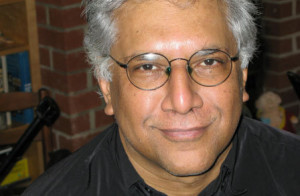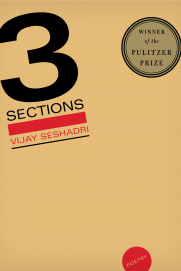A Profile on Vijay Seshadri
April 30, 2014, by Beth Lyons
As National Poetry Month comes to a close, we thought it would be good to profile one of the most prominent poets of our time. On April 14 poet Vijay Seshadri was awarded the 2014 Pulitzer Prize for his book 3 Sections. Seshadri becomes the first Asian American to win the Pulitzer Prize in the poetry category. We asked our resident expert Beth Lyons, Houston poet and PhD candidate at the UH Creative Writing Program, to share a little insight about Vijay Seshadri with us.
 Winner of the 2014 Pulitzer Prize in Poetry for his book 3 Sections, Seshadri is an intriguing poet due to his ability to move between the vernacular and the metaphysical, the surreal to the everyday.
Winner of the 2014 Pulitzer Prize in Poetry for his book 3 Sections, Seshadri is an intriguing poet due to his ability to move between the vernacular and the metaphysical, the surreal to the everyday.
Born in India, Seshadri came to the US at the age of five. He holds a BA from Oberlin College, an MFA from Columbia University and currently directs the graduate non-fiction writing program at Sarah Lawrence College. He is the author of two previous collections of poetry, Wild Kingdom (1996) and The Long Meadow (2003). The Pulitzer committee called Seshadri’s work “a compelling collection of poems that examine human consciousness, from birth to dementia, in a voice that is by turns witty and grave, compassionate and remorseless…”
Seshadri’s work often explores questions of identity and society, with a voice that always has a sly sense of humor. His poem “Thought Problem” begins with the lines:
How strange would it be if you met yourself on the street?
How strange if you liked yourself,
took yourself in your arms, married your own self,
propagated by techniques known only to you,
and then populated the world? Replicas of you everywhere…
Later in the poem, he writes:
…If we have to have people, let them be you,
spritzing your geraniums, driving yourself to the haberdashery,
killing your supper with a blowgun…
Seshadri began writing poetry as a teenager, and notes in an interview the influence of the poetry of the 1960s and early 1970s in his writing. One can see this in his work, the confessional and the contemporary—he always keeps both threads, taking an internal moment and involving the larger world, or directly addressing the reader. Seshadri’s work is driven by narrative and voice, and 3 Sections also shows a mastery of forms from formal rhymed poetry, to free verse, to prose.
What’s most exciting is to realize that Seshadri is only three books into his career, and we will be reading more of his work for years to come.


